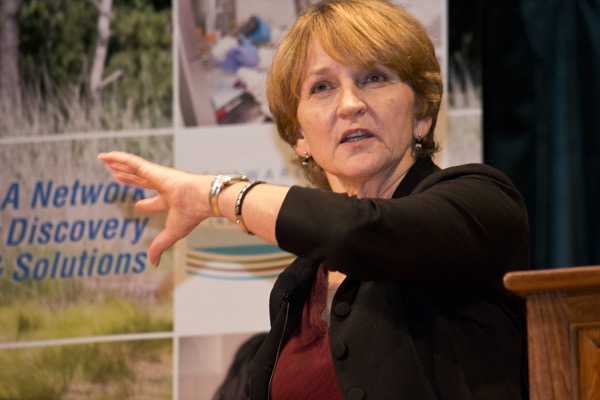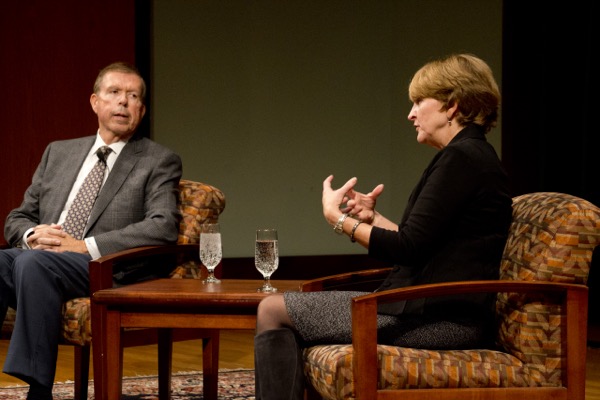


Seeds of sustainability
Stanford dean touts 'use-inspired research' to solve environmental problems
(Editor's note: A video of Pamela A. Matson's Thought Leader presentation is available on YouTube.)
2:52 p.m., Nov. 11, 2014--Scientists have a good understanding of what’s happening to our planet’s life support systems and why, according to Pamela A. Matson, dean of the School of Earth Sciences at Stanford University.
But they haven’t done nearly as well in directing research toward finding solutions to the problems they’ve uncovered.
Campus Stories
From graduates, faculty
Doctoral hooding
“We look around the world right now and see that it’s not going so well. We have a lot of reasons to be concerned,” she said. “So what should we do if we as a university community say we are concerned about this?”
Matson addressed audiences at the University of Delaware in two separate talks on Oct. 30 that illuminated how universities could assist societies and institutions in making a transition to sustainability through “use-inspired research.”
At her first talk, part of the Thought Leader Speaker Series organized to assist the UD community in its strategic planning initiative Delaware Will Shine, Matson gave special attention to the ways universities can support this hybrid between basic and applied research that both improves fundamental understanding and supports decision making.
Use-inspired research must be interdisciplinary, Matson said, coupling both environmental and social systems.
“Focusing too much on either area by itself results in negative unintended consequences,” she said.
Matson cited a number of steps taken at Stanford to facilitate use-inspired, interdisciplinary study, including creating interdisciplinary institutes, centers, departments and schools.
She is a senior fellow at the Woods Institute for the Environment, one of several “institutes of the seven schools” at Stanford, so-called because of their overarching, universitywide structure that involves faculty from all of Stanford’s schools, which are similar to UD’s colleges.
“Our institutes serve as places for intellectual coming together as well as physical,” she said. “It’s a hard thing to maintain. It takes work to keep people engaged together” when the demands of their disciplines are calling.
Matson also advocated the formation of project-based research teams that are formed for the express purpose of solving a particular problem, as well as joint faculty positions across departmental boundaries, recruiting proven leaders in interdisciplinary work and rewarding young faculty for pursuing interdisciplinary approaches.
It is also important to incentivize research aimed at solving particular problems with seed grants and venture funds, Matson said, and to offer support for major efforts in problem solving.
At her afternoon talk, the inaugural presentation in the Delaware Environmental Institute’s Distinguished Scientist Lecture Series, Matson delved further into her own research, providing examples of “unintended consequences,” or at least failure to achieve solutions, when the relationships between environmental and social systems were not adequately understood.
Matson, whose research focuses on the sustainability of agricultural systems, had participated in a research team investigating whether farmers in a wheat-growing region of Mexico could sustain or even improve their crop yields while reducing the amount of fertilizers they used.
Months of field trials had indicated that fertilizer reduction was possible, and the farmers seemed to understand the evidence that the researchers shared through their education and outreach efforts. Yet the farmers continued applying as much fertilizer as before.
The key, according to Matson, was the role played by local credit unions, the most common source of loans to the farming community. Credit union managers pressured the farmers to continue using large amounts of fertilizer as a type of “insurance” against crop failure leading to default on the loans they were providing.
Once the credit unions were brought into the circle of education about the scientific findings, the farmers were able to establish the recommended practices. The work of social scientists was invaluable, she said, in helping to map out the web of influences at work in the community, involving community members in solving the problem, and establishing trust between the scientists and the farmers and others.
Matson has further described the lessons learned in this and other research projects in her recent book, Seeds of Sustainability, Lessons from the Birthplace of the Green Revolution.
Videos of both talks are available for viewing online. The morning talk may be found on the Delaware Will Shine Thought Leader Speaker Series webpage, while the afternoon talk may be found on the DENIN webpage.
Future presenters in the Thought Leader Speaker Series include Earl Lewis, president of The Andrew W. Mellon Foundation, on March 5, 2015. Nominations for series presenters continue to be accepted on this webpage.
For more information about UD’s strategic planning initiative and to share thoughts about the UD of the future, visit the Delaware Will Shine website.
Article by Beth Chajes
Photos by Lane McLaughlin









